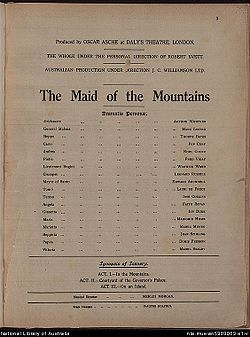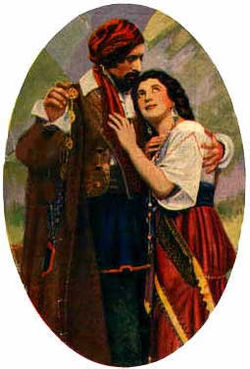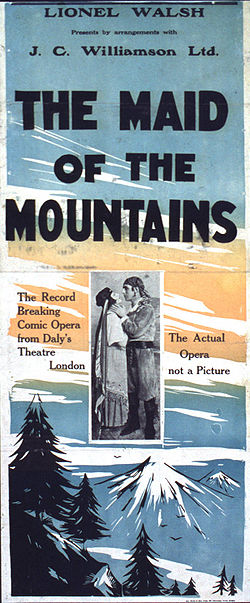
The Maid of the Mountains
Encyclopedia


Operetta
Operetta is a genre of light opera, light in terms both of music and subject matter. It is also closely related, in English-language works, to forms of musical theatre.-Origins:...
or musical comedy
Musical theatre
Musical theatre is a form of theatre combining songs, spoken dialogue, acting, and dance. The emotional content of the piece – humor, pathos, love, anger – as well as the story itself, is communicated through the words, music, movement and technical aspects of the entertainment as an...
in three acts. The music was by Harold Fraser-Simson
Harold Fraser-Simson
Harold Fraser-Simson , was an English composer of light music, including songs and the scores to musical comedies. His most famous musical was the World War I hit, The Maid of the Mountains, and he later set numerous children's poems to music, especially those of A. A...
, with additional music by James W. Tate
James W. Tate
James William Tate was a songwriter, accompanist, and composer and producer of revues and pantomimes in the early years of the 20th century...
, lyrics by Harry Graham
Harry Graham (poet)
Jocelyn Henry Clive 'Harry' Graham was an English writer. He was a successful journalist and later, after distinguished military service, a leading lyricist for operettas and musical comedies, but he is now best remembered as a writer of humorous verse in the tradition of grotesquerie and black...
and additional lyrics by Frank Clifford Harris
Frank Clifford Harris
Frank Clifford Harris was a British lyricist. He often worked with composer James W. Tate....
and Valentine
Archibald Thomas Pechey
Archibald Thomas Pechey often credited simply as Valentine, was a British lyricist and novelist. The pen name Valentine was derived from his mother's family the Vallentins, who were London distillers...
, and the book was written by Frederick Lonsdale
Frederick Lonsdale
Frederick Lonsdale was an English dramatist.-Personal life:Lonsdale was born Lionel Frederick Leonard in St Helier, Jersey, the son of Susan and John Henry Leonard, a tobacconist. He began as a private soldier and worked for the London and South Western Railway...
, best known for his later society comedies such as On Approval. After an initial try-out at the Prince's Theatre
Prince's Theatre, Manchester
The Prince's Theatre in Oxford Street, Manchester, England, was built at a cost of £20,000 in 1864. Under the artistic and managerial leadership of Charles Calvert, "Manchester's most celebrated actor-manager", it soon became a great popular success...
in Manchester
Manchester
Manchester is a city and metropolitan borough in Greater Manchester, England. According to the Office for National Statistics, the 2010 mid-year population estimate for Manchester was 498,800. Manchester lies within one of the UK's largest metropolitan areas, the metropolitan county of Greater...
on 23 February 1916, the show was rewritten and opened at Daly's Theatre
Daly's Theatre
Daly's Theatre was a theatre in the City of Westminster. It was located at 2 Cranbourn Street, just off Leicester Square. It opened on 27 June 1893, and was demolished in 1937.-Early years:...
in London
West End of London
The West End of London is an area of central London, containing many of the city's major tourist attractions, shops, businesses, government buildings, and entertainment . Use of the term began in the early 19th century to describe fashionable areas to the west of Charing Cross...
on 10 February 1917.
Produced by Robert Evett
Robert Evett
Robert Evett was an English singer, actor, theatre manager and producer.-Acting career:In 1892 Evett joined the D'Oyly Carte Opera Company on tour in The Vicar of Bray, playing the Reverend Henry Sandford, the tenor lead. In 1893, Evett added the role of Oswald in Haddon Hall...
(after being turned down by Frank Curzon
Frank Curzon
Frank Curzon was an English actor who became an important theatre manager, leasing the Royal Strand Theatre, Avenue Theatre, Criterion Theatre, Comedy Theatre, Prince of Wales Theatre and Wyndham's Theatre, among others....
) and directed by Oscar Asche
Oscar Asche
John Stange Heiss Oscar Asche , better known as Oscar Asche, was an Australian actor, director and writer, best known for having written, directed, and acted in the record-breaking musical Chu Chin Chow, both on stage and film, and for acting in, directing, or producing many Shakespeare plays and...
(who had directed the record-setting hit Chu Chin Chow
Chu Chin Chow
Chu Chin Chow is a musical comedy written, produced and directed by Oscar Asche, with music by Frederic Norton, based on the story of Ali Baba and the 40 Thieves...
), The Maid of the Mountains ran for 1,352 performances in its initial London run—closing mainly because of the nervous exhaustion of its female lead, José Collins
Jose Collins
Jose Collins was an English actress and singer celebrated for her performances in musical comedies and early motion pictures.-Life and career:...
. This highly profitable run saved the George Edwardes
George Edwardes
George Joseph Edwardes was an English theatre manager of Irish ancestry who brought a new era in musical theatre to the British stage and beyond....
estate, then being managed by Evett, from bankruptcy.
The original New York production (1918) did not catch on, only running for 37 performances. However, Asche also directed the first Australian production for J. C. Williamson
J. C. Williamson
James Cassius Williamson was an American actor and later Australia's foremost theatrical manager, founding J. C. Williamson Ltd....
in Australia in 1917, followed by another production in 1923. This became as successful as the London production, with soprano Gladys Moncrieff
Gladys Moncrieff
Gladys Moncrieff OBE was an Australian singer who was so successful in musical theatre and recordings that she became known as 'Australia's Queen of Song' and 'Our Glad'.-Early years:...
becoming famous as Teresa. The show had major London revivals in 1921, 1930, 1942 (starring Sylvia Cecil
Sylvia Cecil
Sylvia Cecil was an English singer and actress. She began her career in the Gilbert and Sullivan operas with the D'Oyly Carte Opera Company. She soon moved on to musical comedy, including the musicals of Ivor Novello and Noël Coward, as well as variety and radio. Her career spanned at least...
at the London Coliseum) and 1972 in an Emile Littler production at the Palace Theatre in the West End
West End theatre
West End theatre is a popular term for mainstream professional theatre staged in the large theatres of London's 'Theatreland', the West End. Along with New York's Broadway theatre, West End theatre is usually considered to represent the highest level of commercial theatre in the English speaking...
, and at the Finborough Theatre
Finborough Theatre
The Finborough Theatre is a fifty seat theatre in the Earls Court area of London, United Kingdom , which presents new British writing, UK and premieres of new plays, primarily from the English speaking world including North America, Canada, Scotland and Ireland, music theatre, and rarely seen...
, London
London
London is the capital city of :England and the :United Kingdom, the largest metropolitan area in the United Kingdom, and the largest urban zone in the European Union by most measures. Located on the River Thames, London has been a major settlement for two millennia, its history going back to its...
, in December 2006 with a West End cast including Anita Louise Combe
Anita Louise Combe
Anita Louise Combe is an Australian actress, singer, dancer who has worked extensively in the entertainment industry all around the world. Combe attended the Gwen Mackay School of Dancing and trained in the Cechetti method of ballet with Jennifer Pollard in Adelaide, South Australia before making...
, as well as numerous other professional productions elsewhere.
The musical was popular with amateur theatre groups, particularly in Britain, from the 1930s to about 1970.
Background
The Maid of the Mountains was one of the three most important musical hits of the London stage during World War IWorld War I
World War I , which was predominantly called the World War or the Great War from its occurrence until 1939, and the First World War or World War I thereafter, was a major war centred in Europe that began on 28 July 1914 and lasted until 11 November 1918...
(the other two being a revue
Revue
A revue is a type of multi-act popular theatrical entertainment that combines music, dance and sketches. The revue has its roots in 19th century American popular entertainment and melodrama but grew into a substantial cultural presence of its own during its golden years from 1916 to 1932...
entitled The Bing Boys Are Here
The Bing Boys Are Here
The Bing Boys Are Here, styled "A Picture of London Life, in a Prologue and Six Panels," is the first of a series of revues which played at the Alhambra Theatre, London during the last two years of World War I. The series included The Bing Boys on Broadway and The Bing Boys are There. The music...
and the musical Chu Chin Chow
Chu Chin Chow
Chu Chin Chow is a musical comedy written, produced and directed by Oscar Asche, with music by Frederic Norton, based on the story of Ali Baba and the 40 Thieves...
, music or scenes from all of these have been included as background in many films set in this period, and they remain intensely evocative of the "Great War" years. Other hit shows of the period were Theodore & Co
Theodore & Co
Theodore & Co is an English musical comedy in two acts with a book by H. M. Harwood and George Grossmith, Jr. , with music by Ivor Novello and Jerome Kern and lyrics by Adrian Ross and Clifford Grey. It was produced by Grossmith and Edward Laurillard, opening at the Gaiety Theatre on 19 September...
(1916), The Boy
The Boy (musical)
The Boy is a musical comedy with a book by Fred Thompson and Percy Greenbank , music by Lionel Monckton and Howard Talbot and lyrics by Greenbank and Adrian Ross...
(1917), and Yes, Uncle!
Yes, Uncle!
Yes, Uncle! is a musical comedy by Austen Hurgen and George Arthurs, with music by Nat D. Ayer and lyrics by Clifford Grey...
(1917). Audiences wanted light and uplifting entertainment during the war, and these shows delivered it.
Some of the most popular songs were: "Love Will find a Way", "A Bachelor Gay", "A Paradise for Two", "My life is Love", and "Live for Today".
The "romantic" ending, with Teresa finally united to Baldassaré, was personally insisted on by José Collins (in the play as originally written, she ended up with the faithful but less colourful character of Beppo). Beppo and Teresa's duets remain, however, and the role of Baldassaré remains a non-singing part.
Synopsis
The Maid of the Mountains is an escapist story set in a bandit camp, high up in the mountains (presumably in Italy). The bandit maid Teresa loves the bandit chief, Baldassaré, who is feared by the whole country. Baldassaré's men are unhappy because of the decision of Baldassaré to disband, and they ask Teresa to dissuade him. Baldassaré gives Teresa and the others their shares of the spoils of many raids. He tells her that she must leave at once, because their hiding place is surrounded. She pleads to be allowed to stay, but goes sadly. The local Governor, General Malona, captures Teresa and brings her to the Palace of Santo. He wishes to capture the rebel band before the impending end of his term of office. He promises Teresa her freedom if Baldassaré is captured. Teresa refuses, as "there is honour among thieves."Meanwhile, Baldassaré and some of his band have seized the new Governor, Count Orsino. Donning the uniforms of the captives, the brigands proceed to Santo to rescue Teresa. Baldassaré meets and falls in love with Angela, the daughter of the retiring Governor, and becomes heedless of his danger in remaining in the town. He pretends to be the new governor. Beppo, one of the brigands who has always been in love with Teresa, asks her to persuade Baldassaré to leave the capital lest they all be discovered. Teresa, mad with jealousy because of Baldassaré's love for Angela, exposes the new "governor" as Baldassaré, and he and his companions are arrested and sent to Devil's Island
Devil's Island
Devil's Island is the smallest and northernmost island of the three Îles du Salut located about 6 nautical miles off the coast of French Guiana . It has an area of 14 ha . It was a small part of the notorious French penal colony in French Guiana until 1952...
.
Later, Teresa, who sadly regrets betraying Baldassaré, pleads with the General to release him. In the loneliness of his imprisonment, Baldassaré realises that his regard for Angela was only a passing infatuation, and that he loves Teresa. He forgives her betrayal of him and, with the assistance of Lieutenant Rugini, the Governor of the prison, they escape by boat. All ends happily for Teresa and her bandit chief.
Roles and principal cast
- Teresa – José CollinsJose CollinsJose Collins was an English actress and singer celebrated for her performances in musical comedies and early motion pictures.-Life and career:...
(1) - Baldasarre – Arthur WontnerArthur WontnerArthur Wontner was a British actor best known for playing Sir Arthur Conan Doyle's master detective Sherlock Holmes in five films from 1931 to 1937...
- Gen. Malona – Mark Lester
- Tonio
- Beppo
- Carlo
- Andrea
- Pietro
- Lieutenant Rugini
- Crumpet
- Mayor of Santo
- Vittoria
- Angela
- Gianetta
- Maria
- Marietta
- Beppiria
- Pepita
(1) José Collins, who sang the part of Teresa, the bandit "Maid", throughout the original run, became a star as the result of her performance.
Musical numbers

- 1. Friends Have To Part - Opening Chorus
- 2. Live For Today - Beppo and chorus of men
- 3. My Life Is Love - Teresa, Beppo and bandits
- 4. Nocturne - Orchestra Farewell - Teresa
- 5. Dividing the Spoils - Chorus
- 6. Finale Act I - Company
- 7. Introduction & Opening Chours Act II
- 8. Love Will Find A Way - Teresa
- 9. Laughing Chorus Dirty Work - Governor and Tonio
- 10. A Paradise For Two - Teresa and Beppo
- 11. Husbands and Wives - Vittoria and Tonio
- 12. A Bachelor Gay - Beppo
- 13. Finale Act II
- 14. Opening Chorus Act III - Chorus of Fisherfolk
- 15. Good People Gather Round - Governor, Teresa and Chorus
- 16. When You're In Love - Teresa and General Malona
- 17. Over There and Over Here - Vittorio and Tonio
- 18. Finale Act III Friendship and Love - Teresa and Beppo

